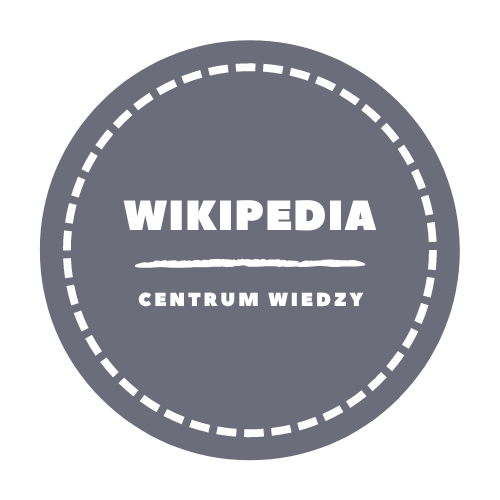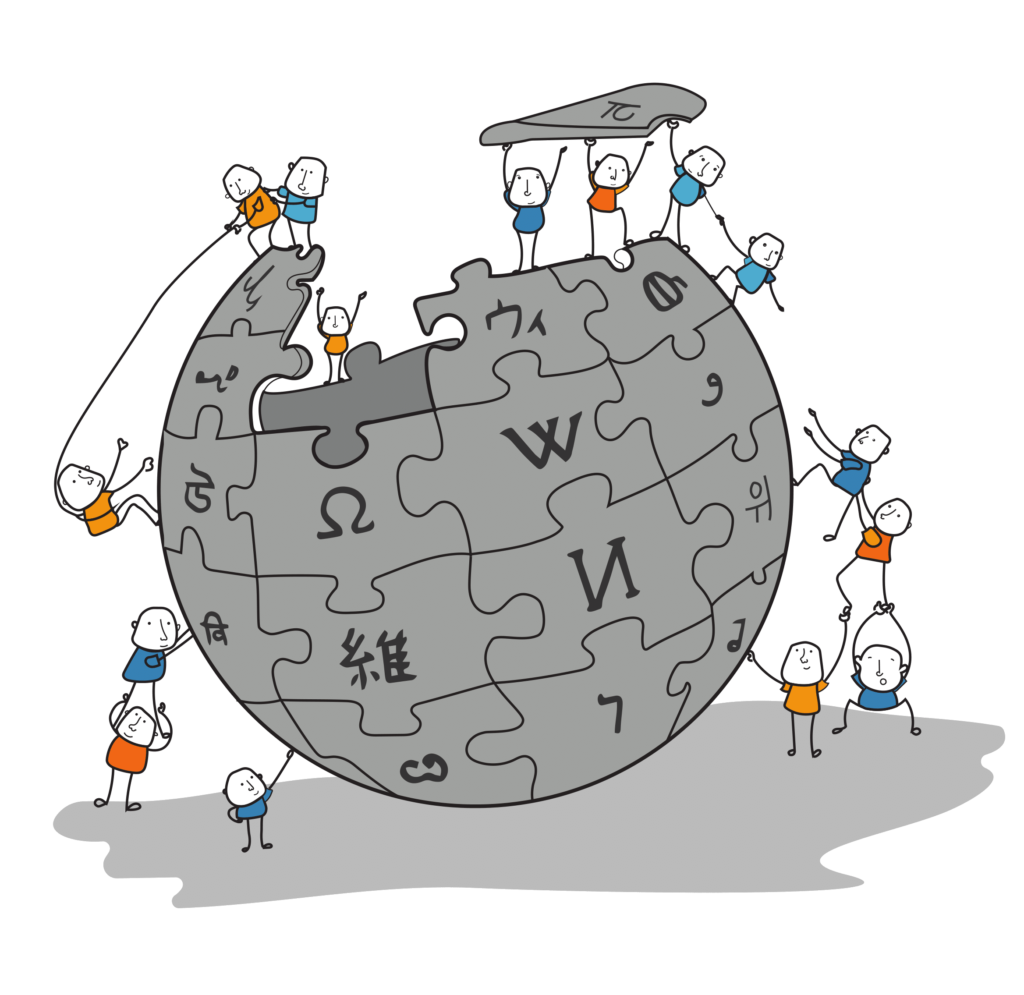
Czym jest Wikipedia?
Dziś wikipedia jest jedną z wielu stron “Wiki” należnych administrowanych przez Fundacje Wikimedia, jest niedochodową organizacjam która poświęciła siuę trudnemu zadaniu którym jest:wiedza dla wszystkich.
Początkowo Wikipedia działała na UseModWiki napisanym w Perlu. Serwer działał na systemie Linux chociaż oryginalny tekst był przechowywany w plikach, a nie w bazie danyc. W 2002 roku został zastąpiony nowym oprogramowaniem, napisanym specjalnie dla projektu, w tym silnikiem PHP wiki. Później została opracowana nowa wersja. MediaWiki wieloktrotnie aktualizowana i działająca do dzis.
Historia Wikipedii.
Pierwsza dekada: 2000-2009
Po ogromnym postępie, jaki dokonał się w pierwszym dziesięcioleciu, spodziewano się, że drugie dziesięciolecie będzie kontynuowane na wysokim poziomie. Stało się jednak odwrotnie – w środę 24 marca 2010 r. wszystkie europejskie serwery Wikipedii przestały działać z powodu przegrzania. Na szczęście problem nie trwał długo, chociaż w niektórych miejscach dostęp do Wikipedii był wolniejszy niż w innych. Do maja 2010 roku problem został całkowicie rozwiązany, a serwis zyskał całkowicie nowy interfejs użytkownika. Postęp trwał przez całą drugą dekadę – w 2011 roku, tuż przed obchodami 10-lecia, angielska Wiki osiągnęła liczbę 3,6 miliona artykułów, a w listopadzie 2011 roku liczba artykułów opublikowanych w angielskiej Wikipedii przekroczyła 3,8 miliona, a liczba edycji strony 500 milionów. W styczniu 2012 r. Wikipedia została wyłączona na 24 godziny w celu poparcia PROTECT IP Act i Stop Online Piracy Act. Te dwie ustawy były w tym czasie przedmiotem debaty w Kongresie Stanów Zjednoczonych.
Druga dekada: 2010-2019

W lipcu 2012 r. doszło do kolejnego całkowitego zamknięcia rosyjskiej Wiki, w proteście przeciwko proponowanej rosyjskiej ustawie o regulacji Internetu. W listopadzie 2012 roku Alexa Internet uznała Wikipedię za szóstą najpopularniejszą stronę internetową na świecie, a w styczniu 2015 roku ta szybka encyklopedia miała już 36 milionów artykułów w przestrzeni głównej. W 2016 r. Wikipedia po raz kolejny ulepszyła interfejs użytkownika swojej strony. Po przekroczeniu progu 6 milionów artykułów w styczniu 2020 roku Wikipedia dramatycznie spadła z rankingu, zajmując 11. miejsce pod względem popularności na świecie według Alexy. W styczniu 2021 r. Wikipedia obchodziła 20-lecie istnienia i obecnie zajmuje 13. miejsce wśród najbardziej popularnych witryn na świecie, spadając o dwa miejsca w porównaniu z rokiem ubiegłym.
Rzetelność informacji na Wikipedii
Wikipedia swoje artykuły opiera na pewnych, już opublikowanych źródłach i materiałach. W przypadku brakuj rzetelnego źródła, artykuł nigdy nie powinien znaleźć się na Wikipedii. Strona posiada szerokie wytyczne, dotyczące przypisów. Każda z informacji opublikowaanych na Wikipedii musi zostać poparta odpowiednimi przypisami, czyli odnośnikami do źródeł podanych treści. Jest to niezbędne w przypadku każdego rodzaju tekstu w przestrzeni głównej, w szczególności jeśli chodzi o wszelkiego rodzajju biografie osób nadal żyjących. Materiał bez przypisów może, a nawet musi zostać natychmiastowo usunięty, bez konieczności informowania o tym osoby publikującej. Wikipedia zastrzega sobie pierwszeństwo zasad nad twórcami. Każdy czytelnik posiadający jakiekolwiek wątpliwości co do rzetelności czytanych informacji, ma prawo zgłosić ten problem.

JAK ZOSTAĆ WIKIPEDYSTĄ

Aby dołączyć do społeczności wikipedystów, trzeba zacząć edytować Wikipedię. Aby być zauważonym warto utworzyć konto użytkownika oraz napisać coś o sobie na własnej stronie użytkownika. Edytowanie wikipedii to rodzaj “przywileju”, który dostaje się na zasadzie kredytu zaufania, że będzie sie stosowało do przyjętych zasad. Kredyt ten można jednak roztrwonić poprzez łamanie zasad. Niewłasciwe zachowanie może skutkować czasowym lub stałym zablokowaniem możliwości edytowania. Wikipedia jest tworzona przez spontanicznie powstałą i stale rozwijającą się społeczność. Przydaje się umiejętność cytowania żródeł, pracy ze żródłem, odróżniania faktów od opinii. Ważna jest także cierpliwość oraz umiejętność selekcji oraz wyszukiwnia żródeł i informacji.
1. What is an encyclopaedia.
Wikipedia is a free digital encyclopedia that allows anyone to freely share and acquire knowledge. Wikipedia is derived from the Hawaiian word “Wiki”, meaning “fast”, and encyclopedia. Therefore, it is safe to consider Wikipedia as a “quick encyclopedia”.
Today, Wikipedia is one of many “Wikis” owned and operated by the Wikimedia Foundation, a non-profit organization dedicated to the difficult task of making knowledge accessible to all.
Initially, Wikipedia ran on UseModWiki, written in Perl. The server ran on Linux, although the original text was stored in files rather than in a database. In 2002, it was replaced by new software written specifically for the project, including a PHP wiki engine. A new version was later developed. MediaWiki has been updated several times and is still functional today.
2. First decade: 2000-2009
Nupedia was founded in the early 2000s by Jimmy Wales and Larry Sanger to publish articles written by experts that can be licensed as “free content”. In January 2001, Nupedia gave birth to Wikipedia to enable collaborative article writing. In 2003, after two years of active Wiki operation, this online encyclopaedia now boasts over 100,000 articles. During these first two years of operation, two sister products were also created: Wiktionary and Wikisource. Thereafter, Wikipedia continued to grow – by the end of 2004 it had recorded over 1 million articles in 100 different languages; in 2005, Hitwise named Wikipedia the most popular reference site. By the end of the first decade, Wikipedia already had over 10 million articles and over 51,000 editors. In 2009, the articles were also licensed under Creative Commons.
Second decade: 2010-2019
After the huge progress made in the first decade, it was expected that the second decade would continue at a high level. However, the opposite happened – on Wednesday 24 March 2010, all European Wikipedia servers stopped working due to overheating. Fortunately, the problem did not last long, although access to Wikipedia was slower in some locations than in others. By May 2010, the problem had been completely resolved and the site had a completely new user interface. Progress continued throughout the second decade – in 2011, just before the 10th anniversary celebrations, the English Wiki reached 3.6 million articles, and in November 2011 the number of articles published on the English Wikipedia exceeded 3.8 million and the number of page edits exceeded 500 million. In January 2012. Wikipedia was shut down for 24 hours in support of the PROTECT IP Act and the Stop Online Piracy Act. These two bills were being debated in the US Congress at the time. In July 2012, there was another complete shutdown of the Russian Wiki, in protest against the proposed Russian Internet Regulation Act. In November 2012, Alexa Internet ranked Wikipedia as the sixth most popular website in the world, and by January 2015, this fast-paced encyclopaedia already had 36 million articles in the main space. In 2016. Wikipedia once again improved the user interface of its site. After crossing the 6 million article threshold in January 2020, Wikipedia dramatically dropped down the ranking, ranking 11th most popular in the world according to Alexa. In January 2021. Wikipedia celebrated its 20th anniversary and now ranks as the 13th most popular site in the world, dropping two places from last year.
3. . Reliability on Wikipedia
Wikipedia bases its articles on reliable, already published sources and materials. If a reliable source is missing, the article should never appear on Wikipedia. The website has extensive guidelines regarding footnotes. Any information published on Wikipedia must be backed up by appropriate footnotes, i.e. links to the source of the content. This is essential for any kind of text in the main space, particularly when it comes to any kind of biography of people who are still alive. Material without footnotes can, and must, be removed immediately without notice to the person publishing it. Wikipedia reserves the primacy of principles over creators. Any reader who has any doubts about the reliability of the information they are reading has the right to report the problem.
4. To join the Wikipedia community, you need to start editing Wikipedia. To get noticed, you should create a user account and write something about yourself on your own user page. Editing Wikipedia is a kind of “privilege”, which you get as a loan of trust that you will follow the rules. However, this credit can be squandered by breaking the rules. Improper behavior may result in temporary or permanent bans on editing. Wikipedia is a spontaneously created and growing community. The ability to cite sources, work with sources, and distinguish fact from opinion is useful. Patience and the ability to select and search for sources and information are also important.